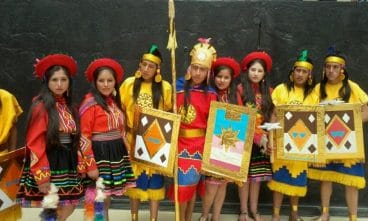
May 12, 2016 | Focolare Worldwide
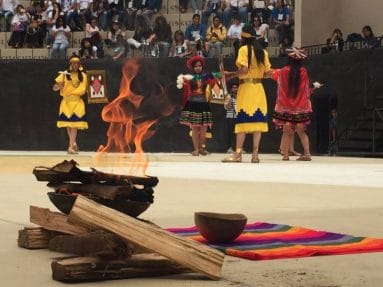 A Festival for Peace concluded United World Week in Ecuador. It was a veritable expo of fraternal actions promoted by the young people of the Focolare Movement. The account of Francesco Ricciardi from the international delegation that travelled the roads of Ecuador in an experience that powerfully brought out the communitarian vocation of the South American continent. “Traditional and modern musical instruments joined together in giving life to a real feast. Young people from Africa, Asia, Europe and the Americas took to the stage. The whole world is in Quito today!” “Even from amidst last week’s destruction, we saw a chain of generosity and solidarity emerge,” Juan Carlos reported. Many concrete experiences of after the earthquake were presented on the stage. Jesús recounts: “When we saw the first pictures, we realized the serious extent of the damages. With several friends we began to organize a collection of basic necessities. We worked from morning until the middle of the night, for love of our brothers and sisters.” Natalia continues: “We focused on areas that were devastated by the earthquake, trying to respond to the cry of suffering. At first it wasn’t clear how we could be of any help. Then I realized that I could love by listening and taking on the pain of the people I met.” David says: “I saw open hands that didn’t hesitate for a single second to give: food, water, medicine and money; hands that didn’t have anything to give, but pitched in to help. I saw an Ecuador shattered by desperation, thirst and fear. But I saw faces of joy, satisfaction and hope at receiving such selfless assistance. I worked beside people who left everything behind: the job, school and even their own family to help people who had lost everything. I got a close up look at the goodness of the Ecuadorians and others.”
A Festival for Peace concluded United World Week in Ecuador. It was a veritable expo of fraternal actions promoted by the young people of the Focolare Movement. The account of Francesco Ricciardi from the international delegation that travelled the roads of Ecuador in an experience that powerfully brought out the communitarian vocation of the South American continent. “Traditional and modern musical instruments joined together in giving life to a real feast. Young people from Africa, Asia, Europe and the Americas took to the stage. The whole world is in Quito today!” “Even from amidst last week’s destruction, we saw a chain of generosity and solidarity emerge,” Juan Carlos reported. Many concrete experiences of after the earthquake were presented on the stage. Jesús recounts: “When we saw the first pictures, we realized the serious extent of the damages. With several friends we began to organize a collection of basic necessities. We worked from morning until the middle of the night, for love of our brothers and sisters.” Natalia continues: “We focused on areas that were devastated by the earthquake, trying to respond to the cry of suffering. At first it wasn’t clear how we could be of any help. Then I realized that I could love by listening and taking on the pain of the people I met.” David says: “I saw open hands that didn’t hesitate for a single second to give: food, water, medicine and money; hands that didn’t have anything to give, but pitched in to help. I saw an Ecuador shattered by desperation, thirst and fear. But I saw faces of joy, satisfaction and hope at receiving such selfless assistance. I worked beside people who left everything behind: the job, school and even their own family to help people who had lost everything. I got a close up look at the goodness of the Ecuadorians and others.”  Some artistic offerings made the celebration even more pleasant and helped to enhance the testimonies. Melany recounts: “When I began to sing in the university chorus I realized that, to have a place in the chorus my friends hadn’t hesitated to offend and insult others. One day, I decided to share the songs I had written. It was a first step. Since then everything has changed. Others have also begun to share their hidden talents that they are finally able to display without fear! The relationship among us all has very much improved. On May 8, 2015 we put together a concert of Latin American music with the goal of transmitting the value of fraternity.” Lebanese young people Giorgio and Lara, even though immersed in one of the bloodiest wars in history, found the strength to love everyone: “The war in Syria has produced 6.5 million refugees inside the country and 3 million have fled to neighbouring countries. Nevertheless, hundreds of public rallies have been held throughout the Middle East to raise funds and supplies of all sorts, and to give a joint witness as Christians and Muslims that unity is possible. Concerts, feasts and prayer vigils have transformed the feast into hope, hatred into pardon and revenge into peace. So many families with such poor financial resources have taken in Iraqi refugees. In Syria many have said to us: “Love conquers all, even when that seems impossible.” David and Catalina presented the “Peace Schools”, a programme promoted in collaboration with Sophia University Institute: “The objective is to create spaces of formation in the theory and practice of fraternity, strengthening relationships with oneself, others, Creation, objects and with transcendence. Universal brotherhood could create a politics that is at the service of all: an economy based on communion; a balanced ecology: a world that is everyone’s home.” The programme is one of the concrete efforts of the United World Project. The festival of inculturation concluded with Samiy, an indigenous young person from the Kitu Kara community: “We’ve spent a week together in which we have experienced that it is possible to bring fraternity, unity, solidarity and peace into our lives, into our local environments and into our world. Humankind is alive. Our commitment is personal, but we can do it only if we feel that we are part of a community. Today we were witnesses to the beauty and diversity and the richness of the cultures.” The joy was irrepressible. During the final song everyone inside the arena was dancing! Young and old, children and teenagers: everyone dancing for joy. But it was no fleeting joy, but the awareness that we are many, a single people with Love for its banner. And as Lidia and Walter said: “This is no conclusion. This is only the beginning!” Source: Città Nuova online
Some artistic offerings made the celebration even more pleasant and helped to enhance the testimonies. Melany recounts: “When I began to sing in the university chorus I realized that, to have a place in the chorus my friends hadn’t hesitated to offend and insult others. One day, I decided to share the songs I had written. It was a first step. Since then everything has changed. Others have also begun to share their hidden talents that they are finally able to display without fear! The relationship among us all has very much improved. On May 8, 2015 we put together a concert of Latin American music with the goal of transmitting the value of fraternity.” Lebanese young people Giorgio and Lara, even though immersed in one of the bloodiest wars in history, found the strength to love everyone: “The war in Syria has produced 6.5 million refugees inside the country and 3 million have fled to neighbouring countries. Nevertheless, hundreds of public rallies have been held throughout the Middle East to raise funds and supplies of all sorts, and to give a joint witness as Christians and Muslims that unity is possible. Concerts, feasts and prayer vigils have transformed the feast into hope, hatred into pardon and revenge into peace. So many families with such poor financial resources have taken in Iraqi refugees. In Syria many have said to us: “Love conquers all, even when that seems impossible.” David and Catalina presented the “Peace Schools”, a programme promoted in collaboration with Sophia University Institute: “The objective is to create spaces of formation in the theory and practice of fraternity, strengthening relationships with oneself, others, Creation, objects and with transcendence. Universal brotherhood could create a politics that is at the service of all: an economy based on communion; a balanced ecology: a world that is everyone’s home.” The programme is one of the concrete efforts of the United World Project. The festival of inculturation concluded with Samiy, an indigenous young person from the Kitu Kara community: “We’ve spent a week together in which we have experienced that it is possible to bring fraternity, unity, solidarity and peace into our lives, into our local environments and into our world. Humankind is alive. Our commitment is personal, but we can do it only if we feel that we are part of a community. Today we were witnesses to the beauty and diversity and the richness of the cultures.” The joy was irrepressible. During the final song everyone inside the arena was dancing! Young and old, children and teenagers: everyone dancing for joy. But it was no fleeting joy, but the awareness that we are many, a single people with Love for its banner. And as Lidia and Walter said: “This is no conclusion. This is only the beginning!” Source: Città Nuova online
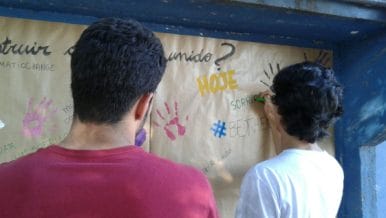
May 2, 2016 | Non categorizzato
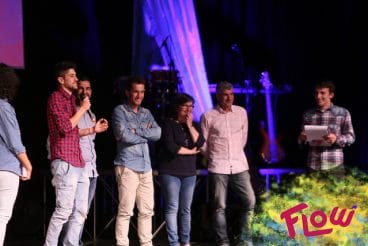 «We have to move on and be a source of light to those who are suffering. Many feel frustrated because they cannot do anything; let us give them the opportunity to help». These words were said by a young girl from Ecuador, a country hit by an earthquake on April 16 and presently living in a humanitarian state of emergency. They indicate the new rota of activities to be held during United World Week 2016. Ecuador is at the centre of this event. United World Week was started by the young members of the Focolare Movement just after the Genfest 1995. It involves the whole Movement. The preparation for the 2016 edition, which focuses its attention on Ecuador and interculturalism, so inherent in countries of the Andean region, has been going on for some time. The aim of this initiative is to give voice to the culture of fraternity which is present in the world and stimulates each person to give of his best. «On May 7, we are organizing a Peace Festival in Quito to express interculturalism. Its title is: ‘Solidarity leads to peace’. Join us and give hope; this is what is needed at the moment and we all can give it». With this appeal, the young people of Ecuador propose a global response to all those who want to offer their support, either through collecting funds or through posting a video message of fraternity and hope on Facebook (fb.com/JMUEcuador). The Peace Festival is just one of the many initiatives launched since the earthquake happened, when many immediately offered the use of their own social networks to spread official emergency information. Run4unity is another event that takes place during United World Week. Teenagers in many parts of the world organize this run from11.00 to 12.00, in different time-zones and with different sport activities. It is concluded by a time-out, a minute of silence or a prayer for peace. Among the landmarks of this event one finds: Mexicali, a Mexican town on the border with USA; here, Run4unity is held along the wall that divides the two countries; Bari, Italy with an activity at the Fornelli Juvenile Penal Institute, and Sopron, a Hungarian town on the border with Austria, where Run4unity forms part of an official sports programme in which young refugees in a refugee camp in Austria also participate (http://www.run4unity.net/2016/en/). United World Week includes also the Living Peace project promoted by El Roward American College in Cairo, Egypt and the Focolare NGO New Humanity. This project which involves a network of secondary schools, with over 50,000 students in 103 countries, aims at instilling a greater commitment to live for peace in different learning environments (http://living-peace.blogspot.it/p/english.html).
«We have to move on and be a source of light to those who are suffering. Many feel frustrated because they cannot do anything; let us give them the opportunity to help». These words were said by a young girl from Ecuador, a country hit by an earthquake on April 16 and presently living in a humanitarian state of emergency. They indicate the new rota of activities to be held during United World Week 2016. Ecuador is at the centre of this event. United World Week was started by the young members of the Focolare Movement just after the Genfest 1995. It involves the whole Movement. The preparation for the 2016 edition, which focuses its attention on Ecuador and interculturalism, so inherent in countries of the Andean region, has been going on for some time. The aim of this initiative is to give voice to the culture of fraternity which is present in the world and stimulates each person to give of his best. «On May 7, we are organizing a Peace Festival in Quito to express interculturalism. Its title is: ‘Solidarity leads to peace’. Join us and give hope; this is what is needed at the moment and we all can give it». With this appeal, the young people of Ecuador propose a global response to all those who want to offer their support, either through collecting funds or through posting a video message of fraternity and hope on Facebook (fb.com/JMUEcuador). The Peace Festival is just one of the many initiatives launched since the earthquake happened, when many immediately offered the use of their own social networks to spread official emergency information. Run4unity is another event that takes place during United World Week. Teenagers in many parts of the world organize this run from11.00 to 12.00, in different time-zones and with different sport activities. It is concluded by a time-out, a minute of silence or a prayer for peace. Among the landmarks of this event one finds: Mexicali, a Mexican town on the border with USA; here, Run4unity is held along the wall that divides the two countries; Bari, Italy with an activity at the Fornelli Juvenile Penal Institute, and Sopron, a Hungarian town on the border with Austria, where Run4unity forms part of an official sports programme in which young refugees in a refugee camp in Austria also participate (http://www.run4unity.net/2016/en/). United World Week includes also the Living Peace project promoted by El Roward American College in Cairo, Egypt and the Focolare NGO New Humanity. This project which involves a network of secondary schools, with over 50,000 students in 103 countries, aims at instilling a greater commitment to live for peace in different learning environments (http://living-peace.blogspot.it/p/english.html).  Loppiano, Italy and Abrigada, Portugal hold their traditional programme for youth on May1. “We are many people living on the same planet, we are brethren. Let us live and work so that this fraternity reigns in politics, in economy, in the social and cultural fields; so that we live in a better world as one family because we are all human beings”. This is the idea that animated the preparation for the Loppiano programme, while Abrigada focused on the idea of peace to demonstrate the highest aspirations of this reality. United World Week embraces the world and local initiatives aim at this goal. Examples of this are the concert for peace at Medan, Indonesia; the visit to a home for the elderly in New Zealand, presently debating the legislation of euthanasia; the Amani Festival in Goma in the Democratic Republic of Congo and the ecumenical workshop wanted by youth and priests of the Catholic, Russian-Orthodox, Armenian, Luteran and Evangelical Churches “to go beyond prejudices”. Very significant is the video message sent from youth in Aleppo, Syria to others in Argentina (fb.com/focolaresconosur). Many of the events may be followed on http://www.unitedworldproject.org/en/ and on fb.com/uwpofficial. Messages, photos and videos may be shared by using hashtag #4peace, thus giving voice to all big and small initiatives that “build bridges of fraternity” every day. Press Release Fotogallery (May Day at Loppiano) https://vimeo.com/164901348 https://vimeo.com/164386629
Loppiano, Italy and Abrigada, Portugal hold their traditional programme for youth on May1. “We are many people living on the same planet, we are brethren. Let us live and work so that this fraternity reigns in politics, in economy, in the social and cultural fields; so that we live in a better world as one family because we are all human beings”. This is the idea that animated the preparation for the Loppiano programme, while Abrigada focused on the idea of peace to demonstrate the highest aspirations of this reality. United World Week embraces the world and local initiatives aim at this goal. Examples of this are the concert for peace at Medan, Indonesia; the visit to a home for the elderly in New Zealand, presently debating the legislation of euthanasia; the Amani Festival in Goma in the Democratic Republic of Congo and the ecumenical workshop wanted by youth and priests of the Catholic, Russian-Orthodox, Armenian, Luteran and Evangelical Churches “to go beyond prejudices”. Very significant is the video message sent from youth in Aleppo, Syria to others in Argentina (fb.com/focolaresconosur). Many of the events may be followed on http://www.unitedworldproject.org/en/ and on fb.com/uwpofficial. Messages, photos and videos may be shared by using hashtag #4peace, thus giving voice to all big and small initiatives that “build bridges of fraternity” every day. Press Release Fotogallery (May Day at Loppiano) https://vimeo.com/164901348 https://vimeo.com/164386629
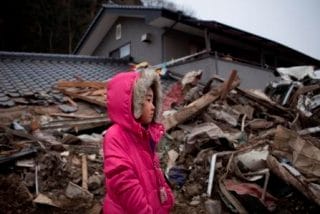
Apr 26, 2016 | Focolare Worldwide, Senza categoria
Isabel shares her state of mind following the earthquake that hit her country, Ecuador, on April 16. The physical structures that fell – bridges, buildings, houses – invite us to feel the earthquake in our own souls as well, and to ask ourselves whether we really are peace builders? I’ve realised that suffering helps to unite us. I’d like to challenge everyone during in these difficult days, to convert and become bearers of hope and optimism, that we help one another to keep faith alive.” There are 587 confirmed dead, and the wounded are more than 8 thousand, with 25 thousand displaced persons. The numbers continue to grow and it is estimated that reconstruction will cost the country billions of dollars. The Focolare Movement has begun a fundraiser for the Ecuador emergency, while they plan intervention on the ground.

Photo: United Nations
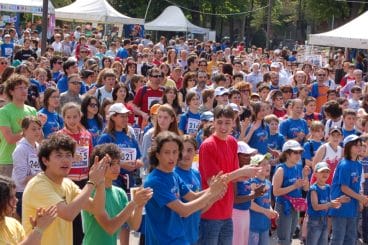
Apr 8, 2016 | Focolare Worldwide, Senza categoria
https://www.youtube.com/watch?v=fmnzghp0ghg&feature=youtu.be This year, the annual event promoted by the youth of the Focolare, which aims to involve the greatest number of people and institutions in the journey towards peace, will be centered in Quito, Ecuador. Intercultural dialogue will be the theme of the youth meeting to be held at the so-called “Other end of the world,” where one foot can be set on the aurora borealis hemisphere and the other on the austral hemisphere. Days of dialogue will ensue among youth of different cultures, along with working and sharing groups, and community tourism surrounded by verdant nature. All the information on the Ecuador programme can be found on www.mundounido2016.com. “Link Cultures – un camino para la paz” is the title that all the fraternal initiatives will have in common, to be held simultaneously throughout the world, uniting generations and cultures in a sole workshop, and can be traced through the hashtag #4peace. 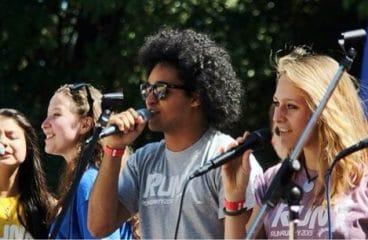 Some historical data. May ’95, the Genfest – a big world event of the Youth for a United World – ended with the launching of the United World Week (UWW): to contribute to the building of peaceful relationships of coexistence among different cultures and peoples, while respecting the identity of each community. A proposal to the public or private, national and international institutions, to highlight and uphold the initiatives that promote unity at every level, the UWW is an integral part of the United World Project. Twenty years after that historic event: a multitude of initiatives of the youth, adolescents and adults, were launched in these editions of the UWW that progressively became known to the general public, the mass media, and institutions worldwide. At all points of the planet, people were strongly attracted to the aim of convincing the world that “this is the time for brotherhood.” In 2010, a global link-up from Hungary paved the way to the UWW. In the 2011 edition the global streaming instead started from the small town of Sassello (Italy), hometown of Chiara Luce Badano, a young member of the Focolare who died in 1990 and was beatified in 2010. The UWW of 2012 preceded the Genfest held in Budapest (12,000 youth in the Sports Arena and 500,000 in a live streaming through the social networks). In 2013 the event was broadcasted from Jerusalem: 120 youth of 25 countries, Muslims, Christians and Jews, lived a strong experience of fraternity, which became a lifelong action plan for the country’s future. The “focus” of the United World Week 2014 was Nairobi, with the reciprocity construction site, “Sharing with Africa,” and the UWW 2015 entitled “Fabric, Flavour, Festival – discovering fraternity” that developed the theme of dialogue at all latitudes. The central event was enlivened by the Youth for a United World of Mumbay, India with the youth of the Hindu Shanti Ashram movement, an ulterior sign of how these events unite different peoples and religions.
Some historical data. May ’95, the Genfest – a big world event of the Youth for a United World – ended with the launching of the United World Week (UWW): to contribute to the building of peaceful relationships of coexistence among different cultures and peoples, while respecting the identity of each community. A proposal to the public or private, national and international institutions, to highlight and uphold the initiatives that promote unity at every level, the UWW is an integral part of the United World Project. Twenty years after that historic event: a multitude of initiatives of the youth, adolescents and adults, were launched in these editions of the UWW that progressively became known to the general public, the mass media, and institutions worldwide. At all points of the planet, people were strongly attracted to the aim of convincing the world that “this is the time for brotherhood.” In 2010, a global link-up from Hungary paved the way to the UWW. In the 2011 edition the global streaming instead started from the small town of Sassello (Italy), hometown of Chiara Luce Badano, a young member of the Focolare who died in 1990 and was beatified in 2010. The UWW of 2012 preceded the Genfest held in Budapest (12,000 youth in the Sports Arena and 500,000 in a live streaming through the social networks). In 2013 the event was broadcasted from Jerusalem: 120 youth of 25 countries, Muslims, Christians and Jews, lived a strong experience of fraternity, which became a lifelong action plan for the country’s future. The “focus” of the United World Week 2014 was Nairobi, with the reciprocity construction site, “Sharing with Africa,” and the UWW 2015 entitled “Fabric, Flavour, Festival – discovering fraternity” that developed the theme of dialogue at all latitudes. The central event was enlivened by the Youth for a United World of Mumbay, India with the youth of the Hindu Shanti Ashram movement, an ulterior sign of how these events unite different peoples and religions.  Run4Unity – Another novelty for this year is the involvement of the children: the world sports event Run4Unity, a relay race for peace which in the previous editions saw the participation of thousands of adolescents, from now on will be held annually as part of the United World Week. Run4Unity 2016 will take place on 8 May. The Youth for a United World hope that this international and travelling expo, now on its 20th year, will be recognised by the UN. The initiatives to be carried out throughout the year, and on which the United World Week will spotlight, are contained in the United World Project platform.
Run4Unity – Another novelty for this year is the involvement of the children: the world sports event Run4Unity, a relay race for peace which in the previous editions saw the participation of thousands of adolescents, from now on will be held annually as part of the United World Week. Run4Unity 2016 will take place on 8 May. The Youth for a United World hope that this international and travelling expo, now on its 20th year, will be recognised by the UN. The initiatives to be carried out throughout the year, and on which the United World Week will spotlight, are contained in the United World Project platform.
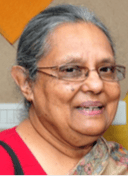
May 6, 2015 | Focolare Worldwide
 “Over the last few days in South Africa, there has been a lot of unrest, violence, violation of human rights… there are some South Africans who have refused to accommodate other brothers of other African nations in the country. It is difficult to see why these sparks of violence have emerged so strongly. We really need to promote tolerance towards the differences in the groups and communities everywhere. The migrants live in fear and many have already returned to their countries of origin, wrote Jacira from Johannesburg. This was the atmosphere in which the 7th death anniversary of Chiara Lubich (22/01/1920 – 14/03/2008) was held, and the seminar was entitled “Religion at the Service of Peace.” The speech of Ela Gandhi, niece of Mahatma, was very meaningful. On her many trips to Italy she had been impressed by the figure of Chiara Lubich and the spirituality of unity, as she so extensively stressed in her long speech. Among other things she also affirmed: “Upon acknowledging, like Gandhiji, that no results can be reached when people are jobless, and lack food, homes and clothing, Chiara conceived the idea of the Economy of Communion in liberty. Taking care of one another is her strong exhortation!” And further explained: “It is love for the others, in the form of mercy, love that opens hearts and hands to embrace the derelicts, the poor, those who have been marginalised from life and the repentant sinners.” “If we believe we are practicing our religion faithfully, when then is there so many battles, wars, abuse of power and sufferings perpetrated by man against man and indescribable atrocities committed by man in this world?” she asked, and strongly affirmed: “Every community of faithful must take the responsibility of correcting the erroneous interpretations of their own faith, and must not abandon their faith.” “Here in South Africa, during the apartheid period which was based on an erroneous interpretation of the Bibles,” according to Ms Ela Gandhi, “Our Christian brothers and sisters agreed with one another to produce the Kairos Document. This document affirms that “the problem in South Africa is not just that of a personal fault, it is a problem of structural injustice.” And Ms Ela Gandhi thus concluded: “Today, when the world and also our country is undergoing a high rate of violence and madness, anger and destruction, poverty and misery, we need to turn our gaze once again toward our concept of Ubuntu and see in what way each one of us can start introducing in his life, the agape, bhavana and many other similar concepts that refer to pure love so as to help create a better world.” More than ever today, to give our own contribution, the members of the Focolare in this country of such immense distances, commit themselves to reach the farthest communities to share the message of peace and unity, fruit of the Gospel lived.
“Over the last few days in South Africa, there has been a lot of unrest, violence, violation of human rights… there are some South Africans who have refused to accommodate other brothers of other African nations in the country. It is difficult to see why these sparks of violence have emerged so strongly. We really need to promote tolerance towards the differences in the groups and communities everywhere. The migrants live in fear and many have already returned to their countries of origin, wrote Jacira from Johannesburg. This was the atmosphere in which the 7th death anniversary of Chiara Lubich (22/01/1920 – 14/03/2008) was held, and the seminar was entitled “Religion at the Service of Peace.” The speech of Ela Gandhi, niece of Mahatma, was very meaningful. On her many trips to Italy she had been impressed by the figure of Chiara Lubich and the spirituality of unity, as she so extensively stressed in her long speech. Among other things she also affirmed: “Upon acknowledging, like Gandhiji, that no results can be reached when people are jobless, and lack food, homes and clothing, Chiara conceived the idea of the Economy of Communion in liberty. Taking care of one another is her strong exhortation!” And further explained: “It is love for the others, in the form of mercy, love that opens hearts and hands to embrace the derelicts, the poor, those who have been marginalised from life and the repentant sinners.” “If we believe we are practicing our religion faithfully, when then is there so many battles, wars, abuse of power and sufferings perpetrated by man against man and indescribable atrocities committed by man in this world?” she asked, and strongly affirmed: “Every community of faithful must take the responsibility of correcting the erroneous interpretations of their own faith, and must not abandon their faith.” “Here in South Africa, during the apartheid period which was based on an erroneous interpretation of the Bibles,” according to Ms Ela Gandhi, “Our Christian brothers and sisters agreed with one another to produce the Kairos Document. This document affirms that “the problem in South Africa is not just that of a personal fault, it is a problem of structural injustice.” And Ms Ela Gandhi thus concluded: “Today, when the world and also our country is undergoing a high rate of violence and madness, anger and destruction, poverty and misery, we need to turn our gaze once again toward our concept of Ubuntu and see in what way each one of us can start introducing in his life, the agape, bhavana and many other similar concepts that refer to pure love so as to help create a better world.” More than ever today, to give our own contribution, the members of the Focolare in this country of such immense distances, commit themselves to reach the farthest communities to share the message of peace and unity, fruit of the Gospel lived.

 A Festival for Peace concluded United World Week in Ecuador. It was a veritable expo of fraternal actions promoted by the young people of the Focolare Movement. The account of Francesco Ricciardi from the international delegation that travelled the roads of Ecuador in an experience that powerfully brought out the communitarian vocation of the South American continent. “Traditional and modern musical instruments joined together in giving life to a real feast. Young people from Africa, Asia, Europe and the Americas took to the stage. The whole world is in Quito today!” “Even from amidst last week’s destruction, we saw a chain of generosity and solidarity emerge,” Juan Carlos reported. Many concrete experiences of after the earthquake were presented on the stage. Jesús recounts: “When we saw the first pictures, we realized the serious extent of the damages. With several friends we began to organize a collection of basic necessities. We worked from morning until the middle of the night, for love of our brothers and sisters.” Natalia continues: “We focused on areas that were devastated by the earthquake, trying to respond to the cry of suffering. At first it wasn’t clear how we could be of any help. Then I realized that I could love by listening and taking on the pain of the people I met.” David says: “I saw open hands that didn’t hesitate for a single second to give: food, water, medicine and money; hands that didn’t have anything to give, but pitched in to help. I saw an Ecuador shattered by desperation, thirst and fear. But I saw faces of joy, satisfaction and hope at receiving such selfless assistance. I worked beside people who left everything behind: the job, school and even their own family to help people who had lost everything. I got a close up look at the goodness of the Ecuadorians and others.”
A Festival for Peace concluded United World Week in Ecuador. It was a veritable expo of fraternal actions promoted by the young people of the Focolare Movement. The account of Francesco Ricciardi from the international delegation that travelled the roads of Ecuador in an experience that powerfully brought out the communitarian vocation of the South American continent. “Traditional and modern musical instruments joined together in giving life to a real feast. Young people from Africa, Asia, Europe and the Americas took to the stage. The whole world is in Quito today!” “Even from amidst last week’s destruction, we saw a chain of generosity and solidarity emerge,” Juan Carlos reported. Many concrete experiences of after the earthquake were presented on the stage. Jesús recounts: “When we saw the first pictures, we realized the serious extent of the damages. With several friends we began to organize a collection of basic necessities. We worked from morning until the middle of the night, for love of our brothers and sisters.” Natalia continues: “We focused on areas that were devastated by the earthquake, trying to respond to the cry of suffering. At first it wasn’t clear how we could be of any help. Then I realized that I could love by listening and taking on the pain of the people I met.” David says: “I saw open hands that didn’t hesitate for a single second to give: food, water, medicine and money; hands that didn’t have anything to give, but pitched in to help. I saw an Ecuador shattered by desperation, thirst and fear. But I saw faces of joy, satisfaction and hope at receiving such selfless assistance. I worked beside people who left everything behind: the job, school and even their own family to help people who had lost everything. I got a close up look at the goodness of the Ecuadorians and others.”  Some artistic offerings made the celebration even more pleasant and helped to enhance the testimonies. Melany recounts: “When I began to sing in the university chorus I realized that, to have a place in the chorus my friends hadn’t hesitated to offend and insult others. One day, I decided to share the songs I had written. It was a first step. Since then everything has changed. Others have also begun to share their hidden talents that they are finally able to display without fear! The relationship among us all has very much improved. On May 8, 2015 we put together a concert of Latin American music with the goal of transmitting the value of fraternity.” Lebanese young people Giorgio and Lara, even though immersed in one of the bloodiest wars in history, found the strength to love everyone: “The war in Syria has produced 6.5 million refugees inside the country and 3 million have fled to neighbouring countries. Nevertheless, hundreds of public rallies have been held throughout the Middle East to raise funds and supplies of all sorts, and to give a joint witness as Christians and Muslims that unity is possible. Concerts, feasts and prayer vigils have transformed the feast into hope, hatred into pardon and revenge into peace. So many families with such poor financial resources have taken in Iraqi refugees. In Syria many have said to us: “Love conquers all, even when that seems impossible.” David and Catalina presented the “Peace Schools”, a programme promoted in collaboration with Sophia University Institute: “The objective is to create spaces of formation in the theory and practice of fraternity, strengthening relationships with oneself, others, Creation, objects and with transcendence. Universal brotherhood could create a politics that is at the service of all: an economy based on communion; a balanced ecology: a world that is everyone’s home.” The programme is one of the concrete efforts of the United World Project. The festival of inculturation concluded with Samiy, an indigenous young person from the Kitu Kara community: “We’ve spent a week together in which we have experienced that it is possible to bring fraternity, unity, solidarity and peace into our lives, into our local environments and into our world. Humankind is alive. Our commitment is personal, but we can do it only if we feel that we are part of a community. Today we were witnesses to the beauty and diversity and the richness of the cultures.” The joy was irrepressible. During the final song everyone inside the arena was dancing! Young and old, children and teenagers: everyone dancing for joy. But it was no fleeting joy, but the awareness that we are many, a single people with Love for its banner. And as Lidia and Walter said: “This is no conclusion. This is only the beginning!” Source: Città Nuova online
Some artistic offerings made the celebration even more pleasant and helped to enhance the testimonies. Melany recounts: “When I began to sing in the university chorus I realized that, to have a place in the chorus my friends hadn’t hesitated to offend and insult others. One day, I decided to share the songs I had written. It was a first step. Since then everything has changed. Others have also begun to share their hidden talents that they are finally able to display without fear! The relationship among us all has very much improved. On May 8, 2015 we put together a concert of Latin American music with the goal of transmitting the value of fraternity.” Lebanese young people Giorgio and Lara, even though immersed in one of the bloodiest wars in history, found the strength to love everyone: “The war in Syria has produced 6.5 million refugees inside the country and 3 million have fled to neighbouring countries. Nevertheless, hundreds of public rallies have been held throughout the Middle East to raise funds and supplies of all sorts, and to give a joint witness as Christians and Muslims that unity is possible. Concerts, feasts and prayer vigils have transformed the feast into hope, hatred into pardon and revenge into peace. So many families with such poor financial resources have taken in Iraqi refugees. In Syria many have said to us: “Love conquers all, even when that seems impossible.” David and Catalina presented the “Peace Schools”, a programme promoted in collaboration with Sophia University Institute: “The objective is to create spaces of formation in the theory and practice of fraternity, strengthening relationships with oneself, others, Creation, objects and with transcendence. Universal brotherhood could create a politics that is at the service of all: an economy based on communion; a balanced ecology: a world that is everyone’s home.” The programme is one of the concrete efforts of the United World Project. The festival of inculturation concluded with Samiy, an indigenous young person from the Kitu Kara community: “We’ve spent a week together in which we have experienced that it is possible to bring fraternity, unity, solidarity and peace into our lives, into our local environments and into our world. Humankind is alive. Our commitment is personal, but we can do it only if we feel that we are part of a community. Today we were witnesses to the beauty and diversity and the richness of the cultures.” The joy was irrepressible. During the final song everyone inside the arena was dancing! Young and old, children and teenagers: everyone dancing for joy. But it was no fleeting joy, but the awareness that we are many, a single people with Love for its banner. And as Lidia and Walter said: “This is no conclusion. This is only the beginning!” Source: Città Nuova online 





